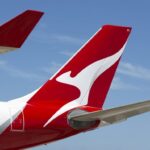Australian Corporates Fly High on Sustainable Fuel
Contributors are not employed, compensated or governed by TDM, opinions and statements are from the contributor directly

In a landmark shift towards greener skies, Australian banks, resource companies, and management consultancies are spearheading the transition to sustainable aviation fuel (SAF) to decarbonise their business travel and meet ambitious emissions reduction targets.
This year, eleven forward-thinking businesses have opted to pay a premium for SAF through Qantas’s corporate sustainable aviation programme. This move prioritises direct contribution to SAF costs over traditional carbon offsets. Among the new entrants, Accenture, Fortescue, and McKinsey & Company have emerged as Partners, collectively addressing 1000 tonnes of carbon emissions. Commonwealth Bank, ING Australia, Deloitte, IMC, and Raytheon Australia have joined as Members, each contributing to offset 400-600 tonnes of carbon emissions.
The surge in participation has seen the SAF Coalition program double in size within its inaugural year, joining forces with five founding partners, including Australia Post, BCG, and Woodside.
Andrew Parker, Qantas Group Chief Sustainability Officer, underscores the significance of SAF in achieving Australia’s decarbonisation goals. “The growing demand from corporate Australia for SAF is a clear vote of confidence in the domestic production of biofuels,” Parker stated. The corporate program is part of Qantas’s broader strategy to manage SAF’s higher costs while championing and investing in local production.
Qantas’s commitment extends to collaborating with industry partners on local technologies and projects aimed at propelling the sector towards net-zero emissions, stimulating economic growth, creating green jobs, and bolstering domestic fuel security.
The Qantas SAF Coalition program employs a “book and claim” methodology, enabling corporates to support SAF scaling and reap environmental benefits, irrespective of whether the fuel powers their specific flights. This approach aligns with the guidance of the Science-Based Targets Initiatives, offering a framework for businesses to integrate SAF into their travel and scope 3 emissions strategies.
The premium paid by these corporates contributes to the 10 million litres of SAF that Qantas secures for its London flights. Notably, Qantas is the sole Australian airline to consistently purchase SAF for its scheduled services and has recently renewed its contract with BP, marking the third consecutive year of SAF acquisition from London.
SAF emerges as the most potent tool for airlines to slash emissions, compatible with current engines and infrastructure without any modifications. Aviation biofuels are lauded for delivering an approximate 80% reduction in life-cycle carbon emissions.
Qantas’s Pledge to the Australian SAF Industry:
- Qantas has established a $400 million climate fund dedicated to sustainability projects and technologies, focusing on fostering a domestic SAF industry.
- In a recent announcement, Qantas revealed that its deals with Boeing and Airbus would secure up to 500 million litres of SAF annually, starting in 2028, potentially fulfilling most of its 2030 SAF target.
- Since 2022, Qantas has been procuring SAF from London and is poised to use it in California, marking significant strides in the airline’s sustainability journey.
The collective efforts of Qantas and its corporate partners are not just a flight of fancy but a determined ascent towards a cleaner, more sustainable future in aviation.
The post Australian Corporates Fly High on Sustainable Fuel first appeared on Stray Nomad Travel News.

